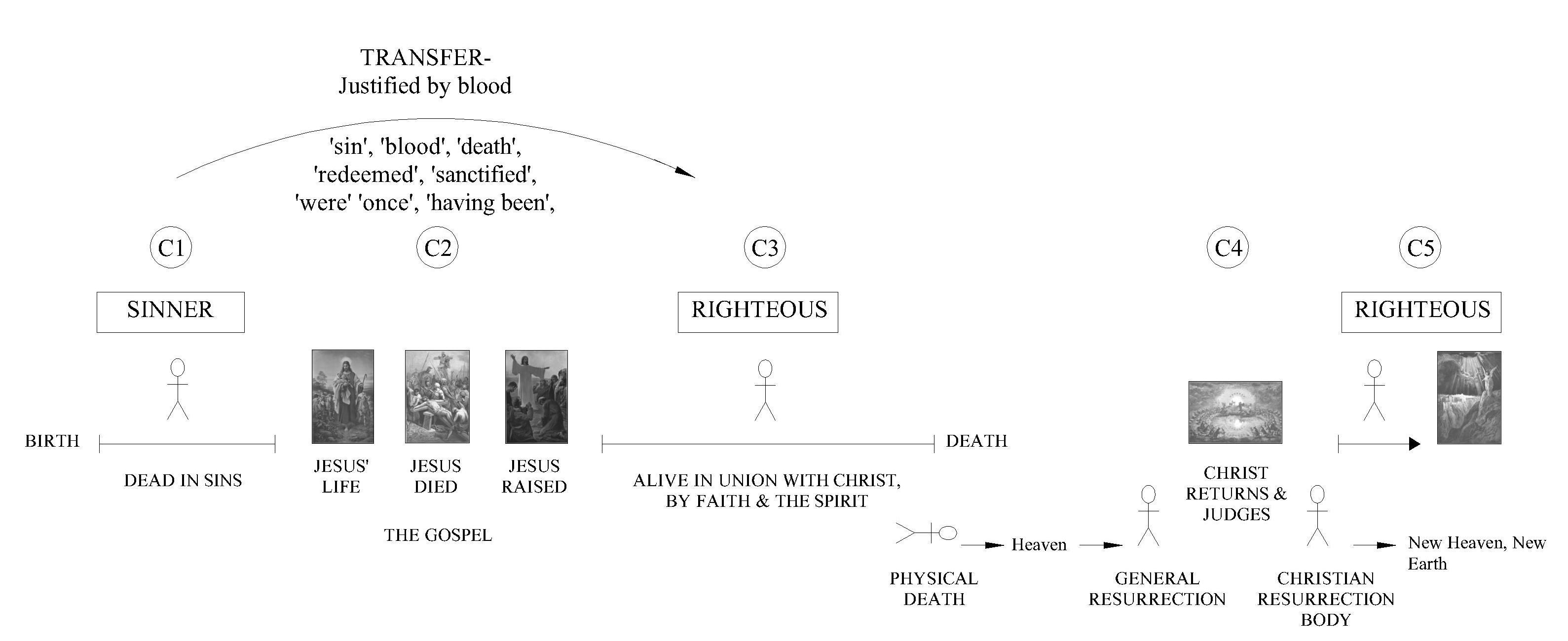
In this post we consider a few passages which state no one can be righteous. These are quite rare, but very commonly quoted to support the reformed doctrines of justification.
This is the seventh of a series of posts on the concept of righteousness and justification in the scriptures. I’ve listed most (if not all) references to right, righteous, righteousness and just, justified and justification in the scriptures to do my own study on what the scriptures say about the concept.
Click on this link to go to the first post which has a summary and links to all.
Contrary to persisting belief
Prior to this point we have been considering the default view of what it means to be righteous in scripture. The main points are having a relationship with God, making a regular practice of righteousness, standing blameless before him (which includes having their sins forgiven). In this default understanding the righteous are commonly contrasted to the sinners and the wicked.
In this post we look at the few passages which suggest no one is righteous. Clearly this stands in tension with what we have been looking at so far.
Born of a woman (Job 15.14-16; 25.2-6)
Eliphaz:
14 What is man, that he can be pure? Or he who is born of a woman, that he can be the RIGHTEOUS?
15 Behold, God puts no trust in his holy ones, and the heavens are not pure in his sight;
16 how much less one who is abominable and corrupt, a man who drinks injustice like water! (Job 15:14–16)
Bildad:
2 “Dominion and fear are with God; he makes peace in his high heaven.
3 Is there any number to his armies? Upon whom does his light not arise?
4 How then can man be in the right before God? How can he who is born of woman be pure?
5 Behold, even the moon is not bright, and the stars are not pure in his eyes;
6 how much less man, who is a maggot, and the son of man, who is a worm!” (Job 25:2–6)
With respect to being clean, women under the covenant law were generally viewed as less clean than men. Especially during childbirth. The law states giving birth is an unclean act that requires the woman to be purified afterward (Lev 12.1-8). Eliphaz and Bildad are saying, how could anyone be considered righteous if he or she is born in an unclean act.
Both refer to varying levels of purity. God is pure, second in order are the heavens, then mankind, then the wicked of mankind. They both seem to use a top-down approach to purity and righteousness. The lower one is, the less pure and righteous they are.
Despite these statements, both Eliphaz (Job 22.15-30) and Job (Job 17.6-10; 27.13-17) persist in calling people righteous.
No one living (Ps 143.1-2; Job 4.17)
A more prominent example is in Psalm 143. I’ve posted on this psalm here.
1 Hear my prayer, O LORD; give ear to my pleas for mercy! In your faithfulness answer me, in your RIGHTEOUSNESS!
2 Enter not into judgment with your servant, for no one living is RIGHTEOUS before you.
3 For the enemy has pursued my soul; he has crushed my life to the ground; he has made me sit in darkness like those long dead. (Ps 143.1-3)
This passage is significant because it refers to the judgment of the LORD and standing before him.
Note this passage is in tension with a significant number of passages in the Psalms which say there are people who are righteous (Ps 5.12; 7.9; 11.3,5; 14.5; 31.18; 34.15,17,19,21; 37.12,16,17,21,25,29,30,32,39; 52.6; 55.22; 58.10,11; 64.10; 69.28; 140.13; 142.7). And also with a number of passages which state some people stand and walk before the LORD as righteous (Gen 7.1; 1 Ki 3.5-6; Lk 1.5-6; Rom 2.13; cf. Gal 3.11). In particular, in Gen 7.1 the LORD says Noah is righteous before him. I believe in addition to the passages in this post, these should frame our understanding of what it means to stand righteous before God in judgment. We will consider this in a later post.
The psalmist says, ‘no one living is righteous before the LORD’ because he knows everyone has sinned. The psalmist is operating with a different mindset that what we have seen so far in which the righteous make a regular practice of righteousness and are contrasted to the wicked. Here is one of the rare occasions where we see the speaker thinking more in terms of sinless perfection. Everyone at some point in time has sinned. Therefore no one is perfectly righteous before God.
In the immediate context the psalmist is being pursued by his enemies. Normally events like this were perceived as signs of the LORD’s displeasure. The psalmist fears his enemies will kill him. The psalmist is clearly humbling himself before the LORD. So, aware of his own sin, he seeks mercy for himself which is one of the benefits of being part of the covenant (Ps 143.8 ‘steadfast love’).
No one is righteous, no not one (Rom 3.10-12)
10 as it is written:
“None is RIGHTEOUS, no, not one;
11 no one understands; no one seeks for God.
12 All have turned aside; together they have become worthless; no one does good, not even one.” (Rom 3.10-12)
Paul is quoting from the Old Testament (Ps 14.1-3; 53.1-3), however the statement ‘none is righteous’ seems to have been added. Perhaps in the LXX version, perhaps Paul’s own addition.
The expression ‘none is righteous’ is clearly in contradiction to numerous passages which affirm some are righteous, including Paul’s own statements (e.g. Rom 5.7). Read literally, the expression also includes God and Jesus Christ himself. Therefore, we must limit the scope to understand Paul’s meaning.
I note soon afterward Paul says;
23 for fall have sinned and fall short of the glory of God, 24 and are JUSTIFIED by his grace as a gift, through the redemption that is in Christ Jesus (Rom 3.23-24)

With this in mind, I interpret the expression ‘none is righteous’ to describe all unbelievers, prior to their justification. In context Paul is specifically including Jewish unbelievers in the condemnation normally given to Gentiles. Again, we will consider this further in a later post.
By works of law no flesh will be justified (Rom 3.20; Gal 2.16)
Many scholars agree Psalm 143.2 is being echoed by Paul in Rom 3.20 and Gal 2.16.
20 For by works of the law no human being [lit. flesh] will be JUSTIFIED in his sight, since through the law comes knowledge of sin. (Rom 3.20)
16 yet we know that a person is not JUSTIFIED by works of the law but through faith in Jesus Christ, so we also have believed in Christ Jesus, in order to be JUSTIFIED by faith in Christ and not by works of the law, because by works of the law no one will be JUSTIFIED. (Gal 2.16)
If in fact Paul is echoing the Psalm, he clearly modifies it. Paul says, ‘by works of law no one will be justified’. I’ve posted on this term at length in my New Perspective Introduction.
Unlike the Psalmist, Paul does not rule out the possibility anyone stands righteous before the LORD. Rather Paul says ‘by works of law no one will be justified’, that is by works of law no one stands righteous in his sight.
This leaves open the likelihood there are other reasons why God’s people stand righteous before God. As mentioned previously, we will consider this further in a later post.
Divine Human comparison (Ps 143.1-3; cf. Mt 7.11; Lk 11.13)
The concept of sinless perfection is also implied in another passage, that which not mentioning righteousness, does make a comparison between God and mankind.
7 “Ask, and it will be given to you; seek, and you will find; knock, and it will be opened to you. 8 For everyone who asks receives, and the one who seeks finds, and to the one who knocks it will be opened. 9 Or which one of you, if his son asks him for bread, will give him a stone? 10 Or if he asks for a fish, will give him a serpent? 11 If you then, who are evil, know how to give good gifts to your children, how much more will your Father who is in heaven give good things to those who ask him! (Mt 7.7-11)
Jesus refers to all humanity as evil. In context he is making a divine-human comparison. I freely admit, all humankind are evil in comparison to God’s goodness.
This leads me to think that where is said or implied man cannot be righteous there may be some kind of divine-human comparison being made.
Overall Theology
Based on the sheer number of passages which affirm there are people who are righteous and there is a group called the righteous I believe we should adopt this mindset by default.
However, the passages in this post which contradict the common belief make it necessary to be aware of the context to see which particular mindset is being adopted.
Either the default view which contrasts the righteous with the wicked or those which seem to be making a divine human comparison.
Copyright © Joshua Washington and thescripturesays, 2017. All Rights Reserved.

